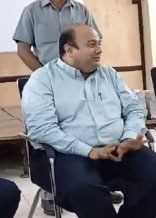
Hyderabad, Oct.22: A media team from Jammu and Kashmir, which is currently on a 5-day visit to Hyderabad, on Tuesday held an interactive session with Amir Khan, Editor of The Siasat, an Urdu language newspaper published from here.
During the interaction, J&K media professionals informed Khan that the media scene in J&K was starkly different to how media operated and functioned in Telangana.
Khan said India must now accept that digital transformation of media space is a reality and a necessity, especially because it had successfully created a space for itself during and after the Covid pandemic.
“We were under the impression initially that our paper could survive as a print medium for another ten years but now our establishment is accepting digitalisation. Our hard copy circulation was around five lakhs at one time but now we are focussed on taking out digital editions in English, Urdu and Hindi and the total readership volume is an estimated one crore. Geographical boundaries are non-existent. Today people in US, Europe and the Middle East are reading our paper online. So our subscriber base has increased,” he said.
When J&K media delegation suggested that the Urdu readership is declining, especially in their region, Khan said, “In Telangana and Maharashtra, there is a steady Urdu readership. It is not declining as was being made out.”
He, however, admitted that it is stagnant.
“In Maharashtra there are 4500 Urdu-centric schools, which has helped the language to survive and prosper,” he said.
When asked whether Urdu is a compulsory language in Telangana, Khan said it is not a state government sanctioned language but efforts are being put by an assistant professor who has suggested that in schools where there are students from the minority community, it is compulsory to employ an Urdu teacher. “Urdu is the language of masses”.
Khan also talked about the National Eligibility cum Entrance Test (Undergraduate), also known as NEET, which formerly was the All India Pre-Medical Test conducted by the National Testing Agency (NTA) for admission of students in undergraduate medical programs.
He said it was a matter of pride and a record of sorts that this year 810 minority students have got medical seats. They were rewarded with gold medals and other awards for their academic performance.
Hyderabad, Oct.22: A media team from Jammu and Kashmir, which is currently on a 5-day visit to Hyderabad, on Tuesday held an interactive session with Amir Khan, Editor of The Siasat, an Urdu language newspaper published from here.
During the interaction, J&K media professionals informed Khan that the media scene in J&K was starkly different to how media operated and functioned in Telangana.
Khan said India must now accept that digital transformation of media space is a reality and a necessity, especially because it had successfully created a space for itself during and after the Covid pandemic.
“We were under the impression initially that our paper could survive as a print medium for another ten years but now our establishment is accepting digitalisation. Our hard copy circulation was around five lakhs at one time but now we are focussed on taking out digital editions in English, Urdu and Hindi and the total readership volume is an estimated one crore. Geographical boundaries are non-existent. Today people in US, Europe and the Middle East are reading our paper online. So our subscriber base has increased,” he said.
When J&K media delegation suggested that the Urdu readership is declining, especially in their region, Khan said, “In Telangana and Maharashtra, there is a steady Urdu readership. It is not declining as was being made out.”
He, however, admitted that it is stagnant.
“In Maharashtra there are 4500 Urdu-centric schools, which has helped the language to survive and prosper,” he said.
When asked whether Urdu is a compulsory language in Telangana, Khan said it is not a state government sanctioned language but efforts are being put by an assistant professor who has suggested that in schools where there are students from the minority community, it is compulsory to employ an Urdu teacher. “Urdu is the language of masses”.
Khan also talked about the National Eligibility cum Entrance Test (Undergraduate), also known as NEET, which formerly was the All India Pre-Medical Test conducted by the National Testing Agency (NTA) for admission of students in undergraduate medical programs.
He said it was a matter of pride and a record of sorts that this year 810 minority students have got medical seats. They were rewarded with gold medals and other awards for their academic performance.
© Copyright 2023 brighterkashmir.com All Rights Reserved. Quantum Technologies